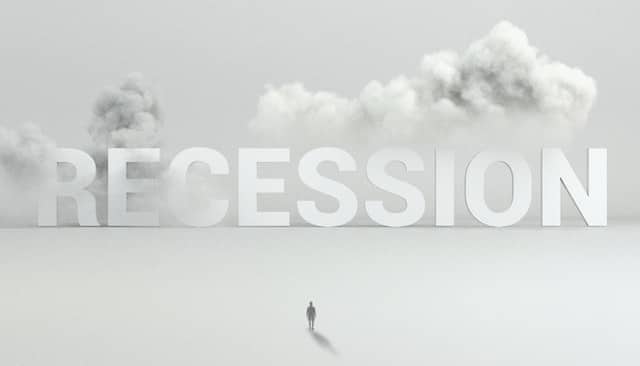[vc_row][vc_column][vc_column_text]Economists and political pundits are debating whether the shrinking Gross Domestic Product (GDP) along with other economic factors means the U.S. has officially fallen into a recession.
Who and What Defines a Recession?
The National Bureau of Economic Research (NBER), a group of economists whose Business Cycle Dating Committee, is the organization tasked with officially declaring when the U.S. economy is in recession – but its definition of “recession” is rather vague. It’s “a significant decline in economic activity that is spread across the economy and lasts more than a few months.” The present economy has contracted for two straight quarters which could count as a recession, but not necessarily. The NBER also weighs unemployment heavily into its assessment, as well as inflation-adjusted income and retail sales. And, typically, the NBER doesn’t even declare a recession until well after it has begun, sometimes for up to a year. “I think we’re at a severe risk that we’re potentially heading into a recession,” Zach Moller, Director of the Economic Program at Third Way, a think tank that champions modern center-left ideas, tells Political IQ. “There’s a risk that inflation doesn’t moderate, so the Federal Reserve decides to not moderate, and that’s going to continue to dampen growth in hiring.” Right now, unemployment is at a near half-century low of 3.6%, with employers having added 2.7 million new jobs even as the economy shrank over the first half of the year. With that in mind, Nicolas Veron, Senior Fellow at the Peterson Institute for International Economics, says, “The labor market is still pretty strong, and so I don’t think the Fed can act on the assumption that a recession is imminent in a real and not just semantic sense.” Meanwhile, inflation is at a 40-year high. Gas prices have now dropped for more than 50 days in a row although they’re still roughly a dollar or so a gallon more than this time last year. Moller notes that the Consumer Price Index, or CPI, which measures inflation, has not yet factored in this drop in gas prices. “The most recent CPI was for data collected in June. So now we are here in August, and next week we will get the next CPI release, but that will be for July,” he says.
Poll: American People Think We’re in a Recession
Yet thanks to inflation, whether the experts officially call it one or not, according to a new CNN/SSRS poll, 64% of Americans feel that the economy is currently in a recession. That includes 56% of Democrats. “Don’t argue over the words,” said Frank Luntz, Republican Pollster and Communications Adviser. “If you can’t afford not just what you want but what you need, that is by definition a recession and people are suffering right now
Will “Inflation Reduction” Bill Make a Difference?
This is why the Democrats are hoping to pass their newly-revamped version of “Build Back Better”—now called “The Inflation Reduction Act of 2022.” This bill has been agreed to by Senate Majority Leader Chuck Schumer (D-NY) and moderate Sen. Joe Manchin (D-WV), who’s often the 50th vote (or not) in the current 50/50 Senate, with Vice President Harris as the tie-breaker for the Democrats. The bill, which includes a prescription drug price reform and clean energy investment subsidies, got a thumbs up from the other often tie-breaker, Sen. Kyrsten Sinema (D-AZ), after Democratic leaders promised to drop a $14 billion tax increase on wealthy hedge fund managers and private equity executives, and change the structure of a minimum 15% tax on corporations. The bill has received mixed reviews from economists. The Wharton School at the University of Pennsylvania, for instance, has determined it will raise inflation in the short-term, then reduce it slightly in 2024. However, another group of 120 economists have backed the bill, citing “quick and noticeably lower” health care costs among its benefits. Moller and center-left Third Way also support the bill. Not just for what’s in it, but for what it stands for. “Part of the way to tackle inflation is to remind everyone that inflation is going down,” Moller explains. “And The Inflation Reduction Act, in passing it, will let everyone know that prices are under control—which, in turn, helps control prices.”
Could a “Small” Recession Help Inflation?
Harvard University Economist Gregory Mankiw has said a “small downturn” might be needed to bring inflation under control, but he added, “I would be surprised if there were a recession without much job loss.” “We definitely want to see some slowing. We don’t want to see the economy overheating.” said Neel Kashkari, President & CEO of the Federal Reserve Bank of Minnesota. “We would love it if we can transition to a sustainable economy without tipping the economy into recession.” However, he warns, “There’s not a great record of doing that. Typically, when the economy slows down, it slows down by quite a bit.” “We want a Goldilocks scenario where inflation comes down at a reasonable pace, and we don’t want to pay too much pain on the other end with a downturn, and people get laid off,” says Moller. However, former Treasury Secretary Larry Summers, former Director of the National Economic Council, said, “My best guess would be that 5% unemployment sort of corresponds to neutral in the current post-Covid environment. And so to have inflation come way down, we are going to have to see unemployment get above that.” “I think the worst scenario at this point is one in which inflation stays for an extended period of time and starts becoming a sense-reinforcing dynamic, with expectations no longer being anchored at low levels,” says Veron. “I think that would be worse than a recession.”
How Long Would It Last?
The shortest recession on record happened at the start of the Covid pandemic, from February to April, 2020. Unemployment reached a record high of 14.7% and GDP fell by 3.4%. The longest and deepest economic downturn, post-Great Depression, was the Great Recession from December 2007 to June 2009. Unemployment reached 10% and GDP fell as much as 2.6%. How long would this recession last, if it happens at all? Moller says it depends. If it’s induced by the Federal Reserve moderating rate hikes, it could last “a relatively short period of time.” But if outside factors like another surge in Covid or gas prices occurs, it could last longer. Veron adds geopolitical factors, like the war in Ukraine, to that mix. He goes on to say, however, “I don’t think there’s a way to forecast the duration of a recession, assuming there is one. But I think it’s also plausible for the Fed to say it’s not necessarily going to be very painful, given the strong labor market and the fundamentals of the economy.” But Moller does warn, “Even if a recession is only six months or so, it feels a lot longer because it can take a while to get back to where you actually were.”
Read more exclusive news from Political IQ.
[/vc_column_text][/vc_column][/vc_row][vc_row][vc_column][vc_raw_html]JTNDZGl2JTIwaWQlM0QlMjJjaGFsa2xpbmVfaWZyYW1lX2NvbnRhaW5lciUyMiUzRSUzQyUyRmRpdiUzRSUwQSUzQ3NjcmlwdCUyMHR5cGUlM0QlMjJ0ZXh0JTJGamF2YXNjcmlwdCUyMiUzRSUwQSUwOSUyOGZ1bmN0aW9uJTIwJTI4JTI5JTIwJTdCJTBBJTA5JTA5Y29uc3QlMjBjbGllbnRDb25maWclMjAlM0QlMjAlN0IlMEElMjAlMjAlMjAlMjAlMjAlMjAlMjAlMjAlMjAlMjAlMjAlMjAlMjAlMjAlMjAlMjBzZXJ2ZXIlM0ElMjAlMjdodHRwcyUzQSUyRiUyRmdhbWVzLnBvbGl0aWNhbGlxLmNvbSUyRiUyNyUyQyUwQSUyMCUyMCUyMCUyMCUyMCUyMCUyMCUyMCUyMCUyMCUyMCUyMCUyMCUyMCUyMCUyMHRhcmdldCUzQSUyMCUyN2NoYWxrbGluZV9pZnJhbWVfY29udGFpbmVyJTI3JTJDJTBBJTIwJTIwJTIwJTIwJTIwJTIwJTIwJTIwJTIwJTIwJTIwJTIwJTIwJTIwJTIwJTIwY29uZmlndXJhdGlvbiUzQSUyMCU3QiUwQSUwOSUwOSUwOSUwOWlzSGVhZGVyRW5hYmxlZCUzQSUyMHRydWUlMkMlMEElMjAlMjAlMjAlMjAlMjAlMjAlMjAlMjAlMjAlMjAlMjAlMjAlMjAlMjAlMjAlMjAlN0QlMEElMDklN0QlM0IlMEElMDklMEElMDl2YXIlMjBzY3JpcHQlMjAlM0QlMjBkb2N1bWVudC5jcmVhdGVFbGVtZW50JTI4JTI3c2NyaXB0JTI3JTI5JTNCJTBBJTA5c2NyaXB0LnNyYyUyMCUzRCUyMCU2MGh0dHBzJTNBJTJGJTJGZ2FtZXMucG9saXRpY2FsaXEuY29tJTJGaW50ZWdyYXRpb24lMkZlbWJlZC5qcyUzRnRzJTNEJTI0JTdCRGF0ZS5ub3clMjglMjklN0QlNjAlM0IlMDklMEElMDlzY3JpcHQudHlwZSUyMCUzRCUyMCUyN3RleHQlMkZqYXZhc2NyaXB0JTI3JTNCJTBBJTA5c2NyaXB0Lm9ubG9hZCUyMCUzRCUyMCUyOCUyOSUyMCUzRCUzRSUyMCU3QiUwQSUwOSUwOXdpbmRvdy5DaGFsa2xpbmVHYW1lcy5ib290c3RyYXAlMjhjbGllbnRDb25maWclMjklM0IlMEElMDklN0QlM0IlMEElMDklMEElMDlkb2N1bWVudC5ib2R5LmFwcGVuZENoaWxkJTI4c2NyaXB0JTI5JTNCJTBBJTA5JTdEJTI5JTI4JTI5JTNCJTBBJTNDJTJGc2NyaXB0JTNF[/vc_raw_html][/vc_column][/vc_row]


